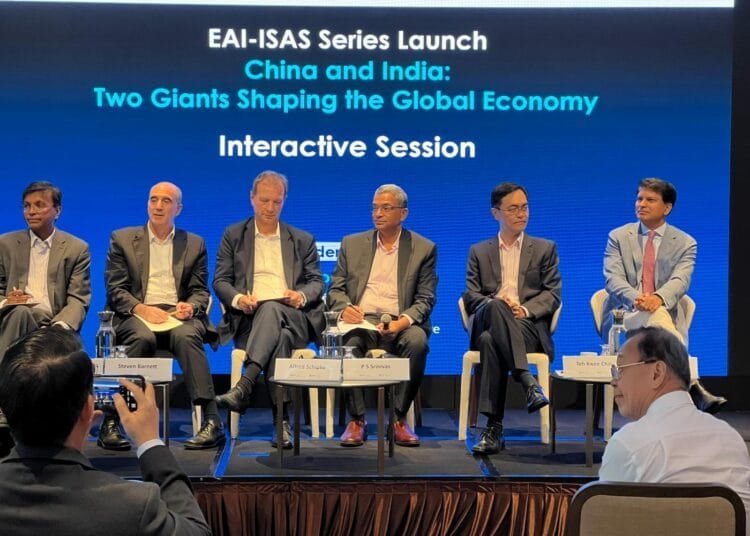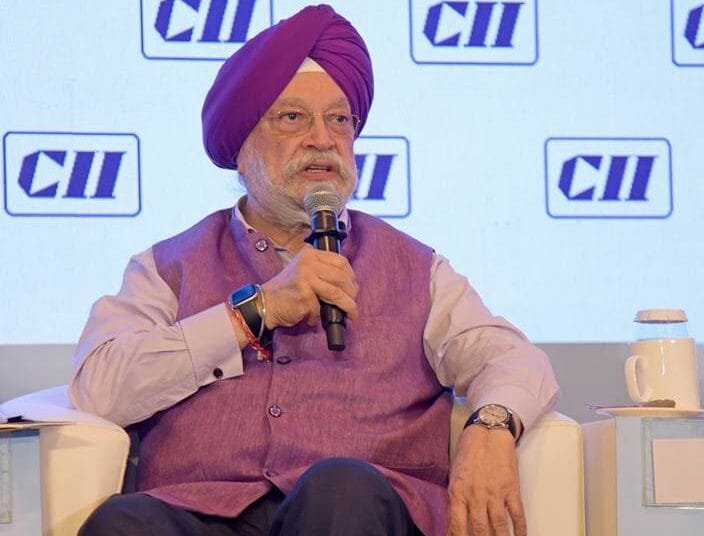EAI-ISAS to hold series on global trend setting Chinese-Indian economies
Singapore and the Southeast Asian region should continue to closely engage both India and China, given both countries’ vital roles in regional growth and development, and as they are projected to contribute 50% of global economic growth in 2024.
Making this call, Singapore’s Senior Minister of State for Foreign Affairs Sim Ann also underlined the significance of China and India as economic powerhouses and pivotal players on the global stage.
She launched a series on “China and India: Two Giants Shaping the Global Economy” on 14 Nov which are to be jointly held by two Singapore think tanks – the East Asian Institute (EAI) and the Institute of South Asian Studies (ISAS) of the National University of Singapore (NUS).
Both the countries have concluded free trade agreements with the Association of Southeast Asian Nations, a 10-member country grouping, and are working on a wide range of multi-lateral and bilateral relationships.
The launch event was also addressed by leading experts, scholars and researchers, including Dr Li Li, Deputy Director of the Institute of International Relations at Tsinghua University, and Professor C Raja Mohan, Visiting Research Professor at ISAS. They spoke on China and India in global order as well as their alignments.
Experts shared their views and opinions on the two countries at the inaugural workshop, pointing out that China and India, the world’s first and third-largest economies by purchasing power parity, wield immense global influence.
Together, the giant economies account for 35% of the global population, 2.8 billion, and are projected to contribute 50% of global economic growth in 2024, said the experts.
The Indian and Chinese economies are key drivers of regional and global trade, deeply intertwined with supply chains and crucial to addressing global challenges like climate change.
Both nations are also at the forefront of innovation in sectors such as financial technology. As members of BRICS, they advocate for reforms in global governance and the financial architecture to ensure fairer representation, said the speakers.
EAI Director Alfred Schipke said at the launch, “China and India stand as pivotal pillars in the global economic landscape, their combined potential driving half of the world’s economic growth in the coming years.
“As key players in trade and innovation, their influence extends beyond borders, shaping policies and addressing global challenges.
“This collaboration between two NUS research institutes (EAI and ISAS) marks a significant step in fostering dialogue and understanding,” he said.
“By bringing together experts and leaders, we aim to deepen insights and strengthen the discourse on how these two nations will continue to impact and redefine the global economy.”
The two NUS research institutes will jointly organise workshops and public events to examine China and India’s growth strategies and their broader impact on the global economy from a policy perspective.
The workshops and events will address key issues such as climate change and the digital economy, with a focus on the evolving roles of China and India in shaping the global economic landscape.
This series, which will bring together academics, policymakers, practitioners and business leaders, will foster dialogue and provide deeper insights into the evolving influence of China and India on the global stage.
The inaugural closed-door workshop was held following the public launch event. Comprising panellists and participants from public and corporate sectors, academic and research fraternity from Singapore, China and India, the workshop discussed the impact of China’s recent economic policy announcements and the implications of the recent United States presidential election for China and India.
ISAS Director Iqbal Singh Sevea noted that both India and China are key players in the realms of global international relations, security and economics. They are also pivotal to the future of digitalisation and the transition to the green economy.
“Overall, the global order is evolving, and the future of the global economy will be shaped by India and China. Thus, we must understand the impact these two countries will have on global trends.
“We look forward to working closely with EAI to organise a series of insightful events focused on these two major global powers,” said Singh. Fiinews.com








